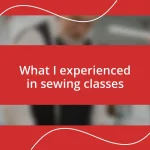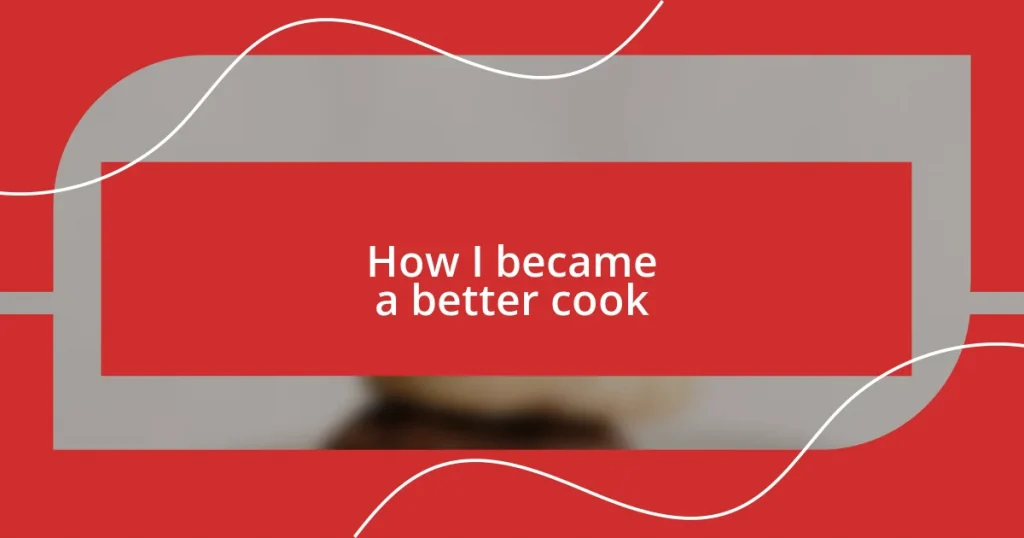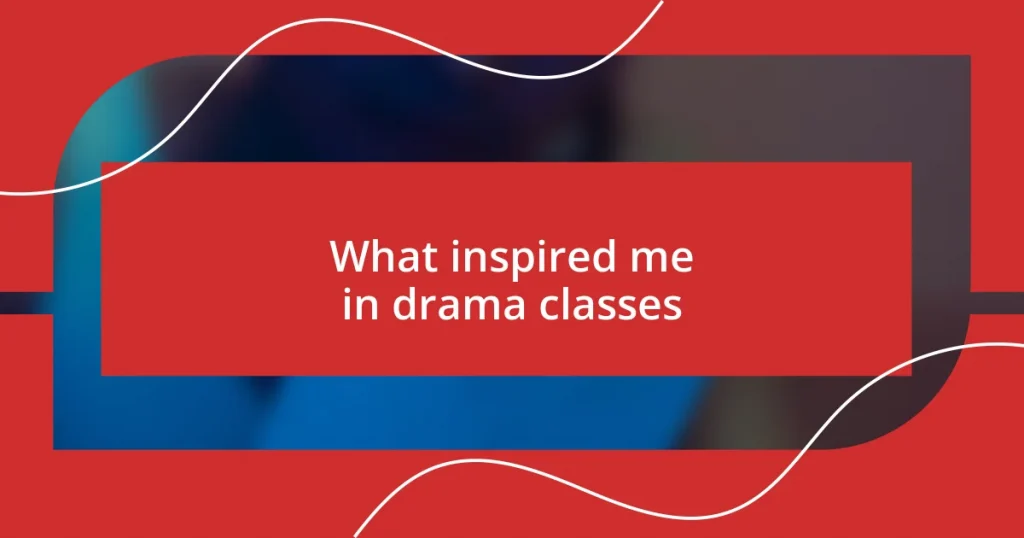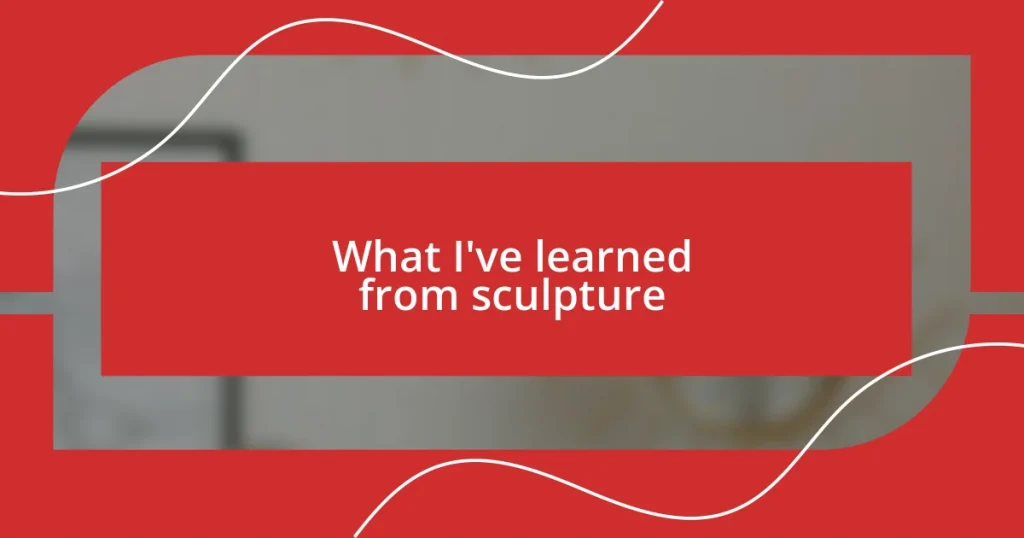Key takeaways:
- Cooking evolved from a daunting task to a therapeutic and creative outlet, enhancing both skills and personal connections.
- Embracing mistakes and experimenting with new recipes fosters confidence, creativity, and a deeper appreciation for the cooking process.
- Seeking feedback from others, including friends and family, provides valuable insights that can transform and personalize culinary experiences.
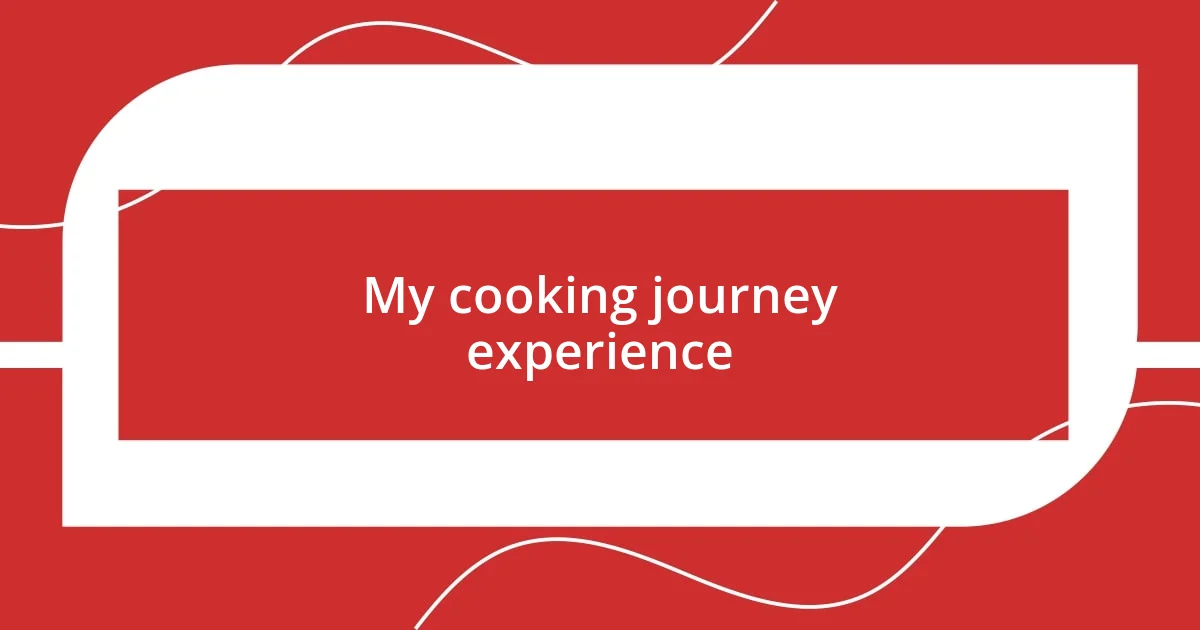
My cooking journey experience
There was a time when I felt utterly intimidated by the kitchen. I still remember the first time I attempted to make a simple pasta dish—it ended in a disaster of overcooked noodles and a tomato sauce that was more like soup. Have you ever had one of those cooking moments that left you questioning your culinary abilities? I can definitely relate.
As I slowly began to experiment with recipes, something beautiful happened. Cooking transformed from a chore into my own form of therapy. There are days when I chop vegetables while listening to music, feeling the rhythmic motion help me unwind. I learned to appreciate the process, engaging with each ingredient and allowing it to guide me. Isn’t it incredible how a simple act like cooking can ground us?
Over the years, my confidence grew, and I took on more complex dishes, from savory stews to delicate desserts. One memorable evening, I hosted a dinner party for friends, determined to impress them. As I plated a gourmet dish, I felt a rush of pride. It made me realize that cooking is not just about nourishing the body; it’s about feeding the soul and sharing moments with loved ones. Have you ever cooked a meal that brought your family together? Those experiences are what truly make cooking rewarding.
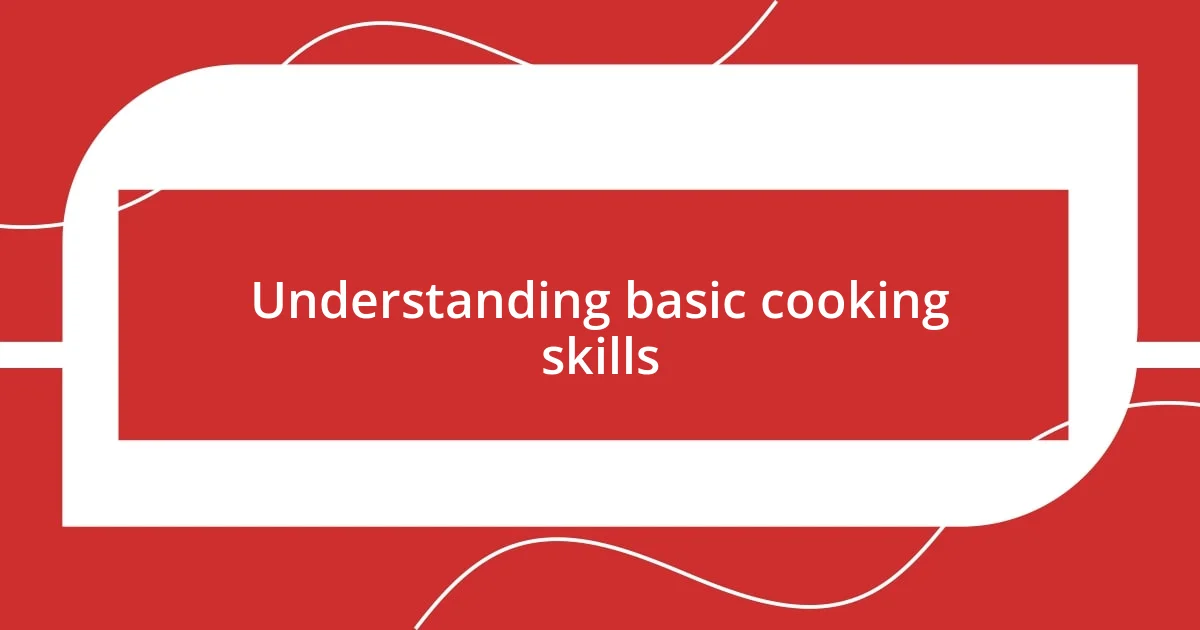
Understanding basic cooking skills
Understanding basic cooking skills is essential for any budding chef. Mastering the fundamentals, like knife skills and knowing how to sauté, allows for greater creativity in the kitchen. I remember the first time I learned how to properly chop an onion; the technique transformed my meals. It felt like uncovering a secret ingredient that elevated everything I cooked.
When learning to cook, it’s vital to understand cooking methods and terminology. For example, do you know the difference between baking and roasting? It took me a while, but learning these distinctions opened up new cooking possibilities. This is where I truly began to enjoy experimenting with flavors and textures, allowing me to personalize my dishes.
Here’s a simple comparison that could clarify these basic techniques:
| Cooking Method | Description |
|---|---|
| Sautéing | Quickly cooking food in a small amount of oil over high heat. |
| Baking | Cooking food using dry heat in an oven at a consistent temperature. |
| Boiling | Cooking food in water or broth at a high temperature. |
| Roasting | Cooking food evenly in an oven, often used for meats and vegetables. |
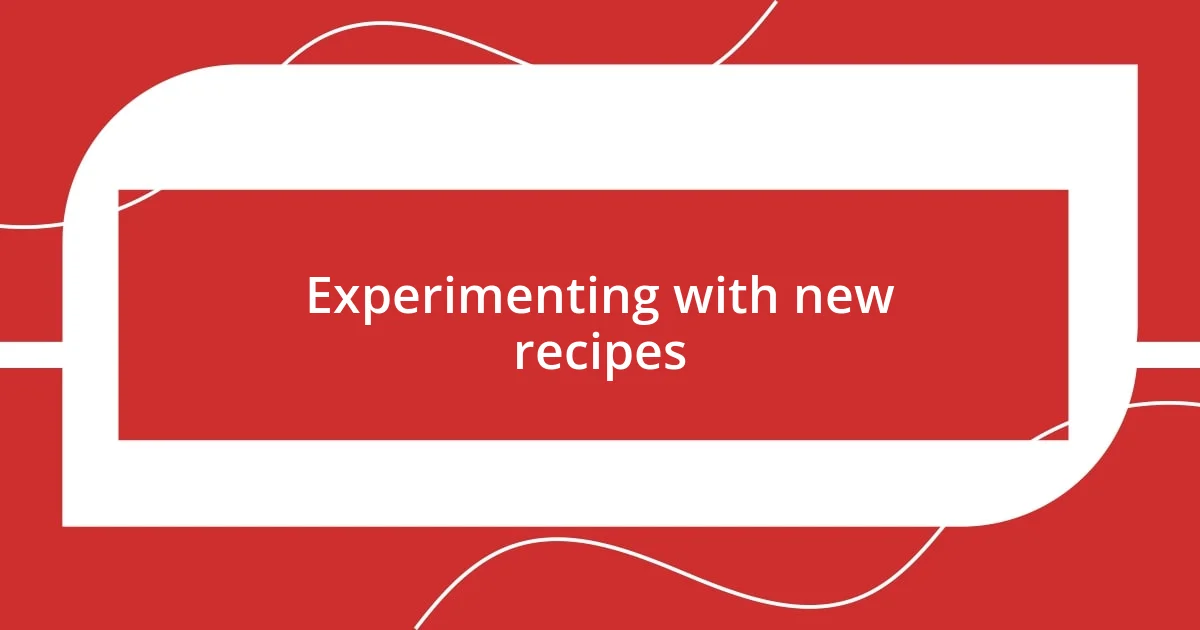
Experimenting with new recipes
Experimenting with new recipes is like going on an adventure every time I step into the kitchen. I remember one particularly daring evening when I decided to try my hand at homemade sushi. Armed with nothing but a bamboo mat and some questionable online tutorials, I rolled that first maki with a mix of excitement and trepidation. The end result wasn’t perfect, but the joy of creating something totally new made my heart race. It reminded me that the process is just as valuable as the outcome.
Here are some benefits I’ve noticed from my recipe experiments:
- Boosts Creativity: Trying new recipes pushes me to think outside the box and explore flavors I’ve never combined before.
- Identifies Personal Taste: I’ve found favorite dishes that reflect my unique palate and cooking style.
- Builds Confidence: Each successful attempt reinforces my cooking skills, making me more adventurous with future dishes.
- Encourages Learning from Mistakes: When things don’t turn out as planned, I gain insight into what went wrong, which only enhances my skills for the next try.
- Creates Special Memories: Cooking new recipes often leads to memorable times shared with family and friends, which I cherish deeply.
Every dish I tackle has its own story, and with each experiment, I find a little more joy in the kitchen—and in myself.
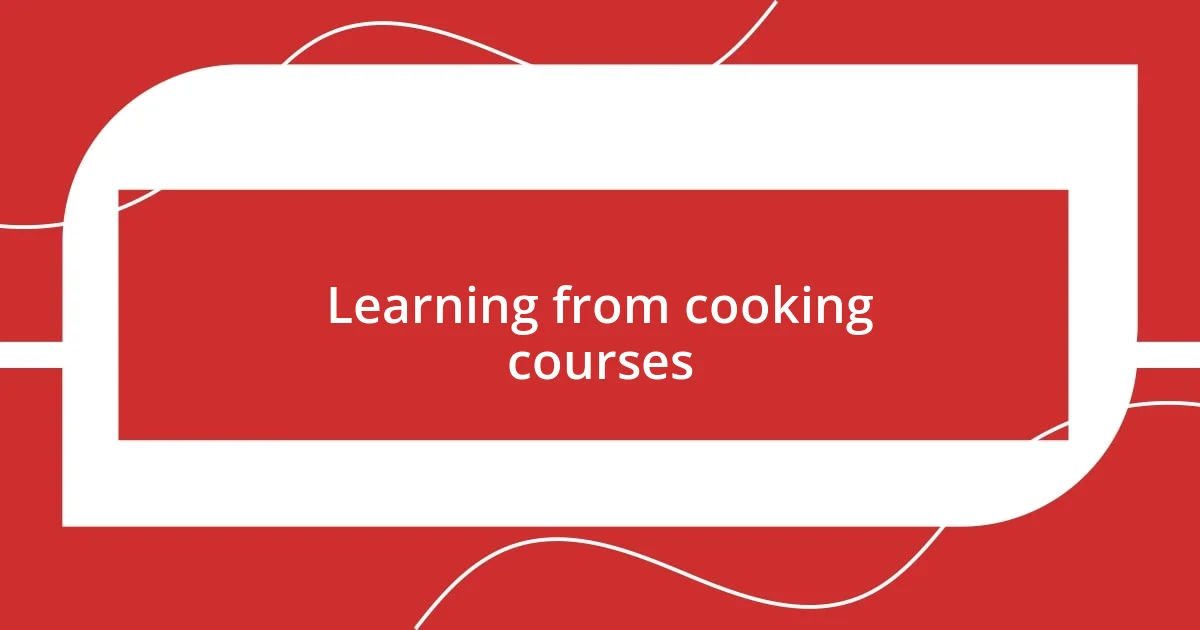
Learning from cooking courses
Learning from cooking courses can be a game changer. When I first enrolled in a local class, I was taken aback by how much I learned about ingredient interactions. I vividly remember the session on seasonings where the instructor emphasized how a pinch of salt enhances the natural flavors of vegetables. I couldn’t believe the transformation! That small adjustment made my dishes taste so much more vibrant and alive.
One of my favorite moments in cooking classes was when we tackled pasta-making. As we rolled out the dough together, the bustling kitchen filled with laughter and chatter reminded me how cooking is also about connection. Have you ever had that feeling of camaraderie while cooking with others? It’s contagious! I left that day not only knowing how to make fresh pasta but also with a new appreciation for the art of cooking as a shared experience.
I’ve also learned that cooking courses provide invaluable feedback. In one instance, I learned the importance of proper seasoning by receiving a critique from the chef about my overly bland soup. Initially, I felt a bit defensive, but reflecting on that advice turned my cooking around. Now, every time I cook, I ask myself: Does this dish have depth? It’s these insights from instructors that not only improve my skills but also instill confidence that I can tackle any recipe with a seasoned chef’s perspective in mind.
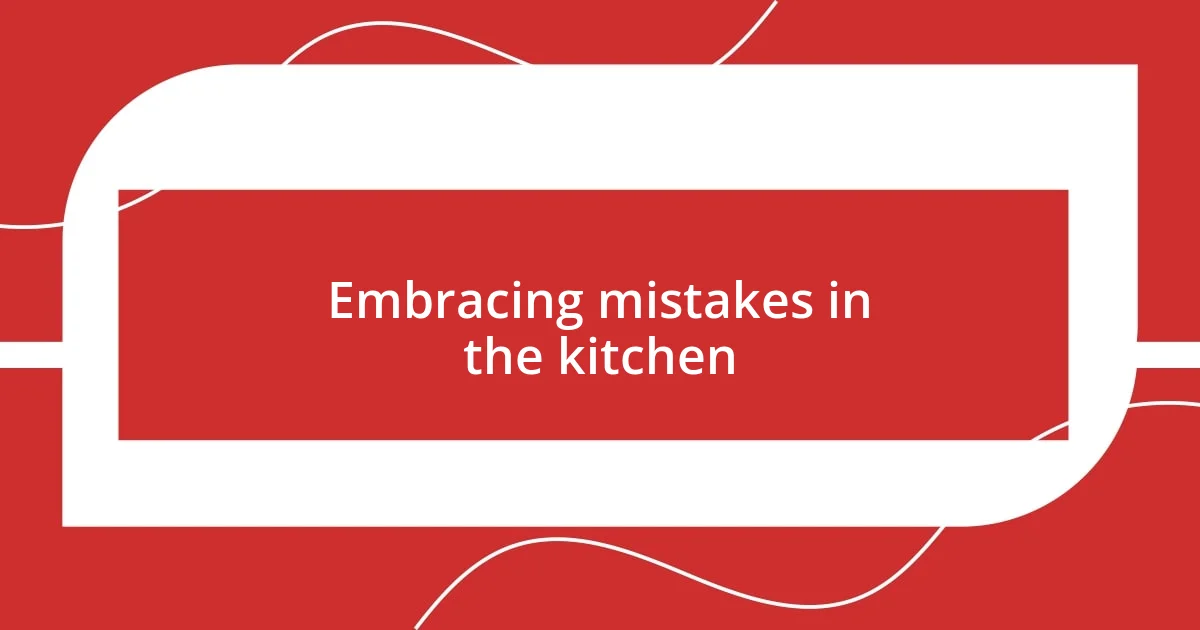
Embracing mistakes in the kitchen
Mistakes in the kitchen used to terrify me. I can still recall the first time I tried to bake a soufflé. As it rose beautifully in the oven, I felt like a culinary genius, only to have it deflate the moment I opened the door. At that moment, I questioned if I was cut out for cooking at all. But instead of giving up, I decided to embrace that flop as a learning experience. Each failure became a stepping stone, teaching me that mistakes are simply part of the cooking journey—a rite of passage, if you will.
I’ve come to realize that those kitchen blunders often lead to unexpected revelations. I once experimented with a spice mix that turned my soup into a delightfully fiery concoction. It was definitely not what I intended, but the mishap opened my eyes to how just a dash too much of one ingredient can transform a dish. This experience has made me more curious and adventurous in my cooking. Have you ever discovered a new favorite flavor by accident? It’s these little surprises that add excitement to our culinary ventures.
I now actively look for opportunities to mess up on purpose. The other day, I tried to recreate a family recipe but decided to swap out ingredients just to see what would happen. The result? A completely different but surprisingly delicious dish! This taught me that it’s okay to deviate from the recipe and experiment with what I have on hand. Embracing mistakes has not just made me a better cook; it’s helped me enjoy the process more. It’s about the laughter shared with friends over a charred pizza or the stories told over a beautifully imperfect meal. In those moments, I found that the heart of cooking lies in the love and laughter shared, not just the perfection of the dish.
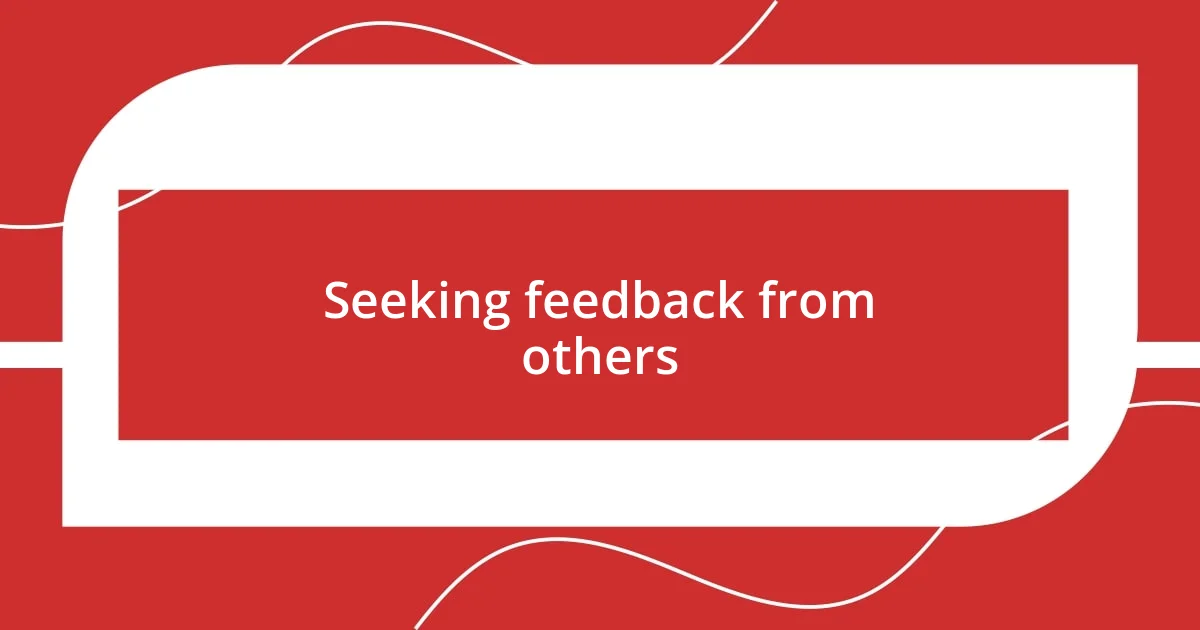
Seeking feedback from others
Seeking feedback has been a turning point in my culinary journey. I remember when a dear friend took the plunge to try my homemade lasagna. As she took her first bite, I felt this blend of anxiety and excitement. “It’s too salty,” she said with a gentle grin. At first, I felt a little embarrassed, but I appreciated her honesty. That moment opened my eyes to the value of perspective and how a fresh set of taste buds can reveal things I might overlook.
Sometimes, I seek feedback proactively. For example, during a casual dinner party, I served a new recipe that I was quite proud of. After everyone had eaten, I passed around a notepad and asked for their thoughts. Sure, it felt a bit vulnerable, like putting my cooking on a stage, but the responses were enlightening! Someone suggested a splash of lemon for brightness, and that simple tweak became a staple in my later versions. Have you ever thought about how this kind of insight could transform your cooking?
Feedback doesn’t have to come from culinary experts, either. I also cherish the opinions of family members—especially kids! My niece loves helping in the kitchen, and her unabashed honesty is refreshing. When she asked, “Why does this chicken taste funny?” it sparked an in-depth discussion about cooking times and techniques. It’s amazing how the simplest yet most genuine feedback can enhance your skills and ignite new passions in your cooking adventure. So, why not invite others into your kitchen journey? Their insights can make your dishes uniquely yours!





